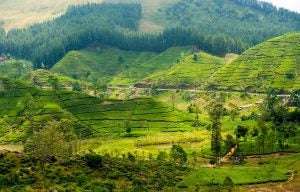In less than a year since Sri Lanka became the first country in the world to fully ban conventional agriculture, an economic crisis of epic proportions has gripped the island nation, launched waves of protests, and on Monday prompted the resignation of Prime Minister Mahinda Rajapaksa. Sri Lanka’s pivot to organic farming — with a ban on synthetic fertilizers — triggered a drastic decline in the production of critical crops like tea and rice, something that many agricultural experts had foreshadowed for months.
Most accounts show that production dropped between 20 percent to 50 percent of what it was prior to the switch, leaving many of the country’s 22 million people in dire straits. These happenings paint the picture of the clear connection between synthetic crop protection products and food security. And not only had Sri Lanka’s ban on fertilizers, pesticides, weedicides, and fungicides resulted in massive food shortages, it also led to the doubling in price of rice, vegetables, and other market staples.
By the time Sri Lanka opted to reverse most of its mandate over the winter, the situation had gone too far.
The turmoil spurred shortages of electricity and other goods and services in Sri Lanka. Many people have died — and scores injured — in economic- and hunger-related protests, and Rajapaksa required a military rescue this week as chaos closed in around him.
Last summer, prior to the changeover to full organic, 30 national experts wrote to Rajapaksa’s brother, President Gotabaya Rajapaksa, outlining their concern over this seismic policy shift. While they recognize the goals of the president’s program, they proposed a phased, consultative approach — with actual experts — rather than cold turkey, emotive mandates.
“Prior to this policy, the government had unsuccessfully tried to commercialize farm land, which is the biggest commercial asset the country has. So many of us think this was another way to try and get farmers to leave their land, or to weaken the farmers’ position and enable a land grab,” Vimukthi de Silva, an organic farmer in Rajanganaya, told The Guardian.
Many news outlets are cataloging the crisis in Sri Lanka, but few are really exploring the meat of what caused it. Sri Lanka chose to push its organic mandate last year because generous governmental subsidies had encouraged the importation of subpar chemical fertilizer, full of impurities. But there was also the pest angle. The Food and Agriculture Organization of the United Nations estimates that as much as 40 percent of the world’s agricultural crops fall prey to voracious critters each year.
Besides robbing the most vulnerable of food security, such a mandate deprives impoverished farmers of their primary source of income — all superficially in the name of “going green.”

The publication Foreign Policy describes: “The farrago of magical thinking, technocratic hubris, ideological delusion, self-dealing, and sheer shortsightedness that produced the crisis in Sri Lanka implicates both the country’s political leadership and advocates of so-called sustainable agriculture: the former for seizing on the organic agriculture pledge as a shortsighted measure to slash fertilizer subsidies and imports and the latter for suggesting that such a transformation of the nation’s agricultural sector could ever possibly succeed.”
Additionally vital is that Sri Lanka’s Extension service should be strengthened to provide impartial, evidence-based advice to farmers. Currently, many farmers rely on the dubious advice of consultants attached to agrichemical companies, who tend to “overprescribe” a concoction of inputs in their own self-interest.
What does this mean for organic in the long term and at scale? That’s still unclear. Does this mean it never works? No.
“I truly believe at some point in the future a revolutionary ag methodology will come to be,” said Jonathan Lawler, an Indiana farmer with unique experience and insights into farm production. “It will combine the best of organic and conventional practices, but will have plenty of wiggle room for evolution based on individual farmer’s circumstances that it can be done anywhere.”
Clashes continue to break out around Sri Lanka, and a curfew has been imposed, but there is no immediate sign that the unrest will end soon.


